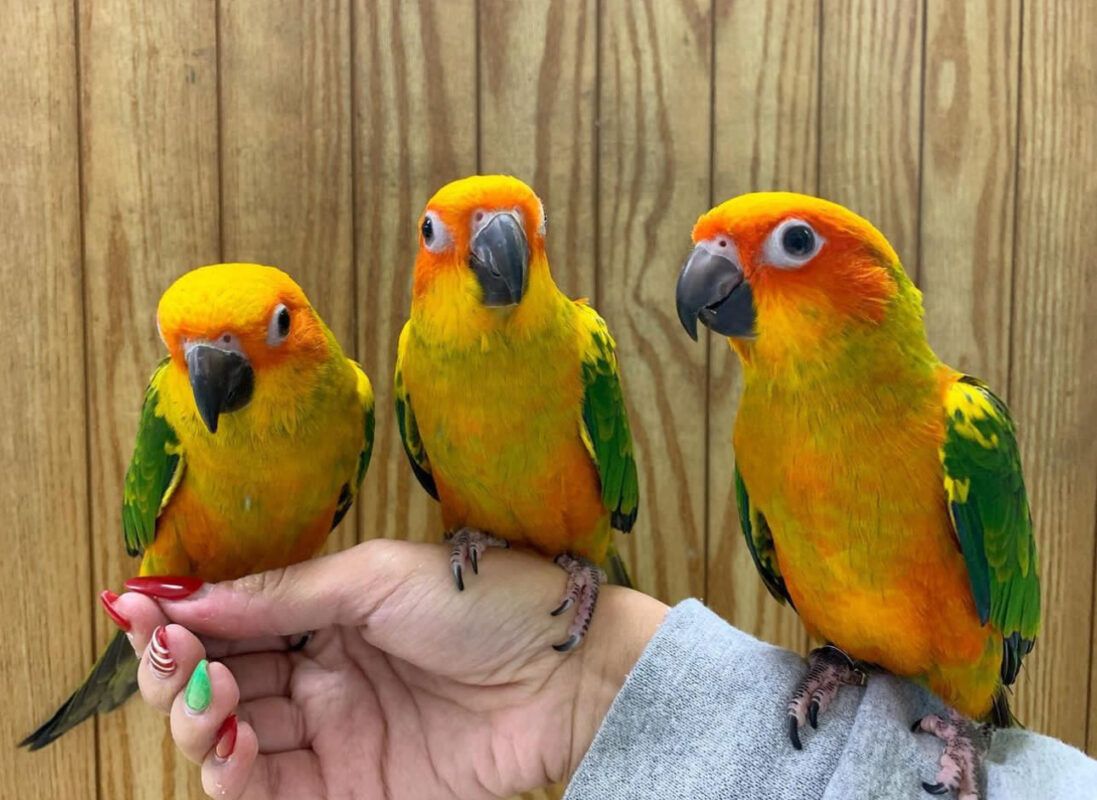From diet and nutrition to housing and exercise, we’ll cover it all. By the end of this guide, you’ll be an expert on sun conure care and husbandry! So let’s get started.
Diet and Nutrition
A healthy diet is essential for any bird, but especially for sun conures. In the wild, sun conures feed on a variety of fruits, seeds, and insects. To replicate this diet in captivity, you’ll need to feed your bird a commercial pelleted diet supplemented with fresh fruits and vegetables. It’s also important to provide your bird with access to fresh water at all times. A healthy diet will help your sun conure maintain a healthy weight, as well as provide them with the nutrients they need to stay active and vibrant. A few things to keep in mind when feeding your sun conure are:
– Avoid feeding them too much sugar, as this can lead to obesity and other health problems.
– Be sure to wash all fruits and vegetables thoroughly before feeding them to your bird, to remove any pesticides or other harmful chemicals.
– Do not feed your sun conure any processed human foods, such as chips, cookies, orother junk food. These foods are not healthy for birds and can lead to health problems down the road.


Housing and Environment
A sun conure’s cage should be large enough for them to stretch their wings and move around freely. The minimum recommended size for a sun conure’s cage is 24 inches by 24 inches by 36 inches. The cage should also have plenty of perches at different heights, as well as toys to keep your bird entertained. It’s also important to provide your sun conure with a variety of environmental enrichment, such as music, videos, and new toys to keep them from getting bored. Your sun conure’s environment should also be kept clean and free of any potential hazards. For example, make sure there are no loose wires or other items that your bird could potentially injure themselves on. You should also avoid placing their cage in direct sunlight, as this can cause overheating. Finally, it’s important to keep the temperature in the room where your sun conure’s cage is located at a comfortable level, between 70 and 80 degrees Fahrenheit. In addition to their physical environment, it’s also important to pay attention to your sun conure’s mental and emotional well-being. Sun conures are very intelligent birds, and they require a certain amount of mental stimulation to stay happy and healthy. A few ways to provide mental stimulation for your sun conure include:
– Spending time training your bird to do tricks or learning new commands.
– Playing games with your bird, such as hide and seek or fetch.
– Providing your bird with puzzle toys that they can figure out how to get treats out of.
– Socializing your bird by letting them interact with other people and animals in a safe and supervised way.
By providing your sun conure with a healthy diet, a stimulating environment, and plenty of socialization, you’ll be ensuring that they have a happy and healthy life. With proper care, your sun conure can live up to 20 years or more! Now that we’ve covered the basics of sun conure care, let’s take a look at some more specific topics. First up, let’s talk about common health problems in sun conures.
Sun conures are generally healthy birds, but there are a few health problems that they are prone to. Some of the most common health problems in sun conures include:
– Psittacosis, also known as parrot fever. This is a bacterial infection that can cause respiratory problems, weight loss, and lethargy.
– Feather plucking, which is a behavioral disorder that can be caused by stress, boredom, or other factors.
– Beak and nail overgrowth, which can be caused by a lack of natural wear and tear.
– Metabolic bone disease, which is a condition that can cause weak or brittle bones.
While these are some of the most common health problems in sun conures, there are many other potential health issues that can affect these birds. That’s why it’s so important to take your sun conure to the vet for regular checkups, so that any potential health problems can be caught and treated early. Now that we’ve talked about health problems, let’s move on to another important topic: grooming.
Grooming Your Sun Conure
Just like any other bird, sun conures require regular grooming to stay clean and healthy. A few things you’ll need to do to groom your sun conure include:
– Bathing your bird regularly. Most sun conures enjoy taking baths, and you can either provide them with a shallow dish of water to bathe in, or mist them with a spray bottle.
– Trimming your bird’s nails and beak as needed. Overgrown nails and beaks can cause problems for your bird, so it’s important to keep them trimmed.
– Brushing your bird’s feathers with a soft-bristled brush. This will help to keep their feathers clean and healthy.

In addition to regular grooming, it’s also important to keep an eye out for any changes in your sun conure’s appearance or behavior. If you notice anything unusual, such as excessive scratching, loss of feathers, or lethargy, it’s important to take your bird to the vet right away.
The Right Diet for Your Sun Conure
As we mentioned earlier, a healthy diet is essential for any bird, but especially for sun conures. In addition to a commercial pelleted diet, sun conures also need a variety of fresh fruits and vegetables in their diet. Some of the best fruits and vegetables for sun conures include:
– Apples
– Bananas
– Oranges
– Broccoli
– Cauliflower
– Carrots
– Spinach
– Kale
– Papaya
– Mangoes
It’s also important to avoid feeding your sun conure any foods that are high in fat, sugar, or salt. These foods can cause health problems for your bird, so it’s best to stick to healthy, low-fat options. In addition to fresh fruits and vegetables, sun conures can also eat a variety of healthy treats, such as nuts, seeds, and cooked grains. When it comes to feeding your sun conure, it’s important to offer a variety of different foods and rotate the types of food you offer on a regular basis. This will help to ensure that your bird gets all of the nutrients they need. Now that we’ve covered diet, let’s talk about exercise.
The Importance of Exercise for Sun Conures
Just like any other animal, sun conures need regular exercise to stay healthy and happy. In the wild, sun conures are very active birds, and they spend a lot of time climbing, flying, and foraging for food. In captivity, it’s important to provide your sun conure with opportunities for exercise, both inside and outside of their cage. Inside the cage, you can provide your bird with a variety of toys and perches to climb on and explore. Outside of the cage, you can take your bird for a daily walk or fly them in a safe, enclosed area. It’s also important to provide your sun conure with plenty of opportunities for social interaction and play. Sun conures are highly social birds, and they need to interact with humans and other birds on a regular basis. Without enough socialization, sun conures can become depressed or stressed. Now that we’ve covered exercise, let’s talk about another important aspect of caring for a sun conure: bonding.
Bonding With Your Sun Conure
Bonding with your sun conure is an important part of caring for them. Sun conures are very intelligent birds, and they form strong bonds with their human caregivers. In order to bond with your sun conure, it’s important to spend time interacting with them every day. This can include talking to them, petting them, and playing with them. It’s also important to handle your sun conure gently and respectfully, and to never force them to do anything they don’t want to do. By bonding with your sun conure, you’ll create a strong and lasting relationship with them.

